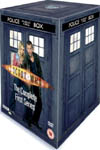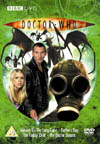DVD Extras (box sets only) include:
The family history "hook" that comes before the title sequence is very artistically done, in both writing and execution, and it ropes you in for the episode. It's so logical too, you wonder why you haven't seen more of it in the show. But... it's going to be England. Again. Seventh story in a row within Earth's orbit. This setting would be far more palatable if it had been preceded with more variety, including the alien planet setting that long time fans crave and have grown to expect from the show, and which new audiences have yet to get to know the show for. Ah, well. Bring us England then. But make it GOOD! As the TARDIS comes to rest, we find ourselves staring with apprehension at an inside out police box door where there used to be an airlock to help us explore the alien planets we miss. Well, at least the ominous mood makes up for the fact that the police box's materializing exterior isn't being shown for any of the many trips it's making. Not a bad trade off, in the end. Then writer Paul Cornell unveils the most fascinating temporal conundrum of the season. This part sent chills up my spine. He could be writing the best story of the season, by tackling such an interesting temporal dynamic. Then again, this could be the stinker if he proves he's got no clue what he's doing. I was on a knife edge, wondering which way my first impression of Cornell would fall. It is difficult to review this portion without getting into a lot of spoilers in detail - you can read all that in the In-depth Analysis version of this review. Basically, extra heroics are added to complicate things, much to my approval. Then the magic starts, and things go downhill. It then became apparent that Paul Cornell in fact did NOT know what he was doing, and was guiding the Doctor with his own ignorance. Damn! Never before in 26 years of television had England's great time traveling adventure series shown time being "changed" by special effects on screen. You might have had characters talk about the potential, and in some cases believe it had happened, but characters can always be wrong, and the visuals supported this duality. Star Trek, on the other hand, had used its larger special effects budget to screw up time-travel visually on-screen within its first year, and happily continued to do so more and more often as the franchise grew. How sad to see Doctor Who now start to slide down that slippery slope. By using magical effects, Cornell, as a writer, seems to be stuck for a way to make his conundrum work in an arena with only one timeline, which can be changed but mustn't be. And so he cops out and waves his problems away with a magic wand. We may as well write a story about what happens when a ship sails off the edge of the Earth. Back in medieval times, they'd buy it too. Tighten the emotional dramatic turns with great performances and they'll rave over it. But, bring it to modern audiences today, and they'll laugh. Unfortunately, most people today don't seem to appreciate how ridiculous it is to try to protect a past timeline as if it's the only one in existence, and will let the boogeyman out of the closet if it's messed with. You can experience as many other versions as you can time-travel back to, and it would be nearly impossible to make all the "right" choices to re-live any of them exactly as you remember them. So the Doctor, sadly, makes an ass of himself trying to defend Cornell's model of time, and rightly gets tripped up when Rose confronts him for being hypocritical about the heroics he proudly displays in almost every other setting he lands in. Good for you, Rose, keep it up! The Doctor can only offer the really lame remark that he knows what he's doing, when he's got me completely convinced of the opposite. Where do you want to draw the line, between the heroics that are acceptable to "time", and the heroics that are not? This is fuzzy territory that need not bog us down at all, if we wake up to the model of time with unlimited parallel choices. Perhaps the upcoming release of "Inferno" (story no. 54) on DVD will help remind us all of the Doctor's revelation of something more than he's arguing for here. Unfortunately, Paul Cornell controls the universe of this story, imbibing it with as much illogical magic as necessary to drive his points home melodramatically. I did take heart when the magic began to repeat itself, for reasons suspensefully kept unknown, hoping that this might offer an alternate explanation for that which Cornell hadn't yet satisfyingly accounted for. Sadly, the boogeymen responsible for this new phenomenon are demonstrated to be another side effect of the temporal magic that we have witnessed, rather than one of its causes. The Doctor contradicts his own explanations of their motives, furthering my disbelief that he or Cornell know what they're doing. Are they trying to fix what has happened, or just take advantage of it for their own ends? The Doctor describes it both ways at different points in the story, making the episode's plot logic more and more frustrating to try to follow. (What? Oh, they're falling over the edge of the Earth. All right, let's indulge Paul Cornell for the rest of the hour then.) One can only shake one's head in disbelief, and sit back and enjoy what really does work in this story, which is Rose's family history. Shaun Dingwall gives a remarkably moving performance as Rose's Dad, Pete Tyler, who is really well written for. Also, you've got to love Camille Coduri as Rose's mother in this one. Her character grows far beyond the ditzy blonde we saw in previous episodes, and gets to demonstrate an entire range of emotions and depth of character. Great stuff. Billie Piper does some of her best emotive acting opposite her father in this one, and the Doctor also has a great little scene with the bride and groom of yet another wedding. Lots of good stuff. Both the Doctor and the final heroics of the story are pretty lame. I do miss watching Doctors like Jon Pertwee cobbling some wires and components together to drain the energy of otherwise mystical creatures, or trap them in crystals... you know, being resourceful with whatever is at hand. Eccleston doesn't prove very resourceful in this story, and most often offers his advice when it's already too late, with a side-order of recrimination. So we end up with a very predictably silly final climactic act, which does nothing to explain the additional magic of the wrap-up. The Doctor's right, whether you want to quote this one from this episode, or Tom Baker's Doctor from "City of Death" (story no. 105). Those who don't understand time shouldn't be messing with it. Or writing it.
This story has become available on DVD:
Note: The 13-episode box sets contain commentaries, behind-the-scenes featurettes, and other extras. The 4-episode volume only features the plain episodes. Comments on this article are welcome. You may contact the author from this page:
|








